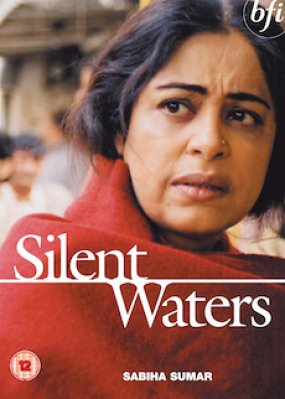
Golden Leopard, Best Film – Locarno International Film Festival 2003.
Best Actress, Kirron Kher – Locarno International Film Festival 2003.
Silent Waters (Khamosh Pani), the first feature by Pakistani independent documentary filmmaker Sabiha Sumar, is an intense and rare cinematic perspective of the political evolution of Pakistan, the advent of fundamentalism and the fragile rights of ordinary women. The film was selected for The Times BFI London Film Festival in 2005.
It is the hot summer of 1979 in the halcyon Pakistani Punjabi village of Charkhi near the Indian border. Ayesha (Kirron Kher) is a widow, haunted by the horrors of Partition. She lives for her 18-year-old son Saleem (Aamir Malik). He is deeply in love with the proud and beautiful Zubeida who is planning to be a career woman. All seems blissful in the village until the news of General Zia coming to power, and the arrival of two strangers from Lahore preaching revolutionary Islamic values. The young village men, including Saleem, quickly get swept up in the religious fervour. Matters intensify with the arrival of Sikh pilgrims from India who come to worship at the local shrine, Saleem breaks off with liberal Zubeida and begins carrying a gun. Ayesha has a mysterious visitor who forces her to unveil a shocking secret with catastrophic consequences.
Born in 1961 in Karachi, Sabiha Sumar has earned acclaim for her films which usually focus on the politics and social criticism of her native country and especially address the problems and conflicts of its women. Her first film, Who Will Cast the First Stone (1988), was shown on Channel 4 and won the Golden Gate award at the San Francisco International Film Festival. She subsequently set up her own production company and more TV documentaries followed including Where Peacocks Dance (1992) and Suicide Warriors (1996), about a women’s suicide brigade and their struggle for a separate homeland for the Tamil people of Sri Lanka. In 1999 she made Don’t Ask Why, featuring a 17-year-old girl’s probing view of life in Pakistan, and in 2003 For a Place under the Heavens, but it was Silent Waters that earned her global recognition. She comments”
“My films are about what we Pakistanis must think about, change or reflect upon. As film culture grows I am sure my work will be seen by a wider audience. Today however, it is restricted to private viewings or small screenings organised by women’s organisations or cultural institutes. This decline was caused by General Zia’s martial law, which killed the culture of cinema, and his hard censorship policies destroyed the small commercial film industry. Things seem to be changing for the better on the commercial film scene but it will still take a long time for any alternative cinema to take root in the country.”
Special features
- Illustrated booklet with essays.
- Details on the historical background of the film.
- A director’s note.
- An interview with Sabiha Sumar.
- Sabiha Sumar biography.
Product information
-
-
Certificate
12
-
Colour
Colour
-
Sound
Sound
-
Running time
95mins
-
Languages
Punjabi
-
Subtitles
English
-
Original aspect ratio
1.85:1
-
DVD region
2 Europe (except Russia, Ukraine, and Belarus), Middle East, Egypt, Japan, South Africa, Swaziland, Lesotho, Greenland, French Overseas departments and territories
-
Catalogue number
BFIVD722
-







